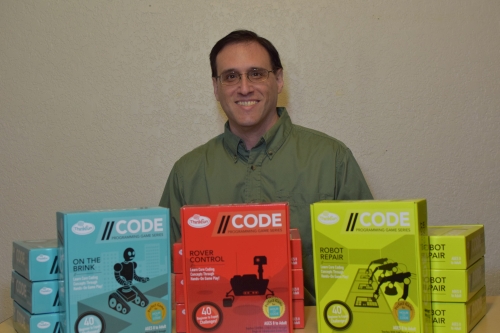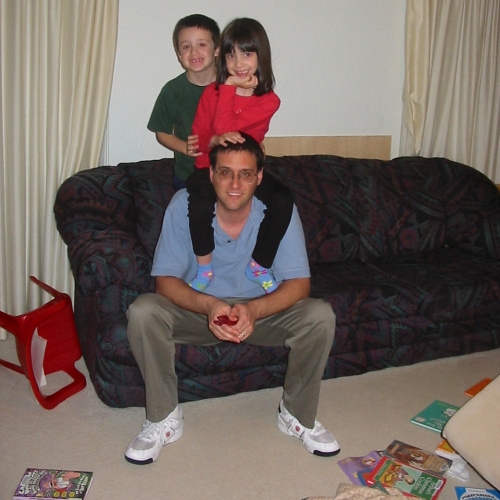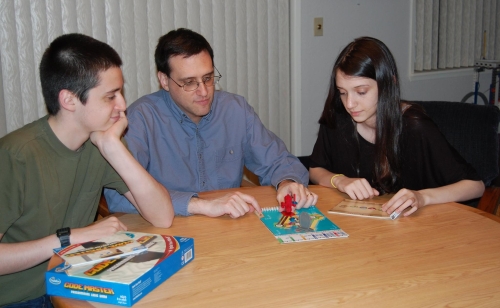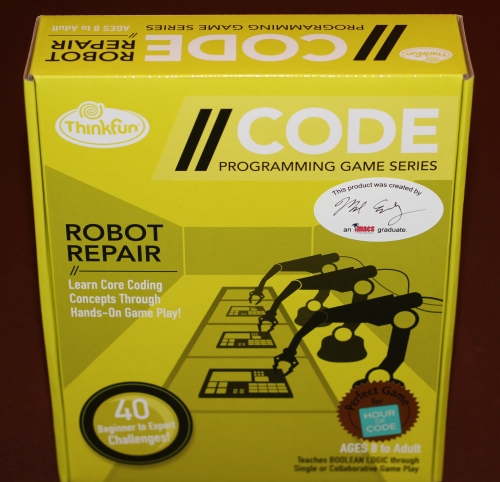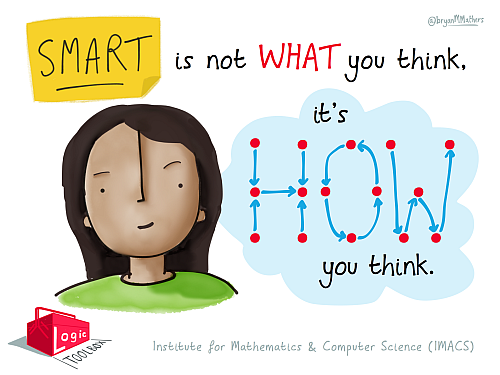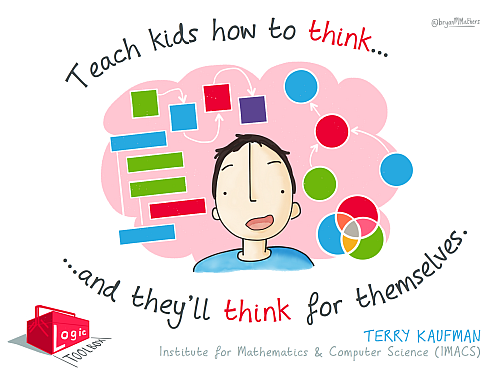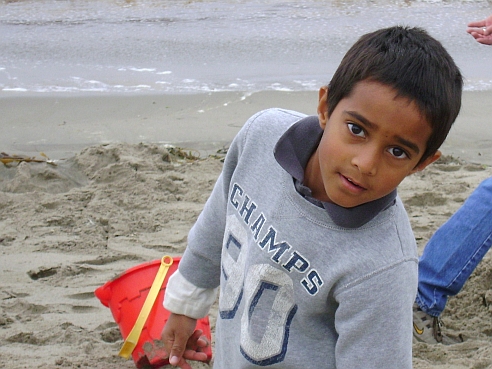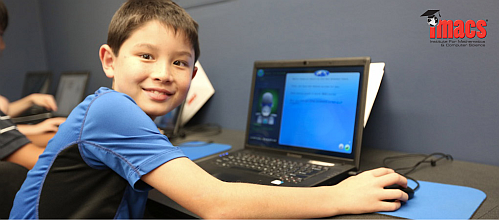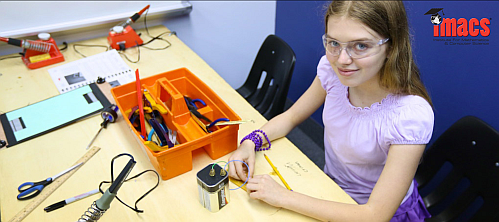
The IMACS Blog reconnects with alumnus Mark Engelberg who recently released three new coding games through ThinkFun and Target. (Win an autographed copy of one of Mark's new games!) Mark's passion for computer science, math and logic led him to an award-winning career in puzzle and game design. He is also an active speaker in the Clojure programming language community. In this post, Mark talks with IMACS about what it was like to be a homeschool dad to two amazingly talented children who are now accomplished young adults in their own right.
First, tell us about your new ThinkFun games.
Two years ago, I invented a programming puzzle game for ThinkFun called Code Master. Code Master was a commercial and award-winning success, so ThinkFun asked me to develop a new line of puzzle games, where each game would highlight a specific underlying principle of computer science. The new line of games is called the //CODE Programming Game Series. To design the games, I started from a list of concepts I wanted players to encounter, and kept trying out ideas and tinkering with the rules until I felt I had a combination of mechanisms that covered those concepts and was fun to play.
The first game in the series, On the Brink, is an introduction to procedural abstraction — the idea that we're not just writing programs to solve a one-off task, we're building components that solve multiple instances of an underlying problem, and then using those components to build higher-level components, and so on. The second game, Rover Control, focuses on the essential skill of stepping through programs in your head and visualizing the outcome, particularly with flow control constructs like if-then-else statements, while loops and for loops. The third game, Robot Repair, is all about Boolean logic. When developing Robot Repair, I leaned heavily on the material that I learned as a child in IMACS' Advanced Mathematical Logic courses. I think students in your Logic courses are really going to enjoy Robot Repair. Like their predecessor, Code Master, all three of the new games are "unplugged" computer science board games that come with a book of puzzles for solo or cooperative gameplay.
You are also a parent of two gifted children who are now ages 19 and 17. About how old were Alex and Molly when you first suspected that they were gifted? What were the signs?
I was a stay-at-home dad, and when Alex and Molly were toddlers, I taught them to read and write and gave them daily math lessons. Honestly, I mostly did those things to keep myself from getting bored; it was fun for me to feed their intellectual curiosity. My wife did the same with the kids when she was home from work. That was just our parenting style. We wanted the kids to have the opportunity to learn these core skills as soon as they were capable, and the easiest way to achieve that was to throw a lot of educational activities at them early, just to see what would stick. As it turned out, more of it stuck than we expected!
I didn't really have much to compare their development to until the day I went to Alex's kindergarten orientation. As the teacher explained what the students would be doing in the coming year, it dawned on me that my kids had already done those things. I realized that I had inadvertently given my kids a big jumpstart, and what I had been doing was working, so I might as well keep doing it. And that's how I ended up deciding to homeschool my kids.
Because I homeschooled my kids, the label "gifted" didn't really come into play. I never needed to get them tested, or prove anything to a school official. But it was clear to me that they had the capacity to learn faster than what our school system provides, so I set out to do my best to keep them challenged and allow them to fully develop their individual talents.
How did you feel when you knew for certain that they were gifted?
It felt like a tremendous responsibility to help them achieve their full potential, even more so because I was choosing to take on that responsibility myself rather than relying on the school system. If things didn't work out, I would have no one to blame but myself. It was a lot of pressure. I didn't really doubt my capability to teach them, but I knew it would be an enormous undertaking, one that would require the bulk of my time and attention for nearly 20 years. It was well worth it — I'm so proud of the young adults they've become — but I'm relieved to have reached the point where that responsibility is behind me rather than in front of me.
As you looked into ways to meet their educational needs, what did you discover?
One pleasant surprise was realizing that it isn't necessary to be an expert in everything in order to meet your kids' educational needs. In many cases, it's more about playing the role of an advocate, connecting them up with the right resources. I would track down private teachers, public school classes, homeschool co-op classes, other parents, books, videos, and websites for the areas I was less equipped to handle. I did my part for the homeschooling community by serving as a teacher of math and computer science for many other talented kids whose parents were not as adept at those particular subjects.
What were some of the programs, opportunities or approaches that you found helpful in making the most of their talents and interests?
One of the things that was really important to me was to make sure my kids had a strong foundation in math and computer science. Fortunately, I have the advantage that I learned the IMACS curriculum when I was in middle school and high school. This made it easy for me to teach these subjects because I'd already experienced first-hand what a top-tier math and CS education looks like. To duplicate that experience for my kids, I simply taught them using the same materials and techniques that I had learned at IMACS and in college. Those resources played a big role in giving me the confidence to homeschool.
What were some of the benefits and challenges of homeschooling? How did you deal with the challenges?
One of the biggest challenges of homeschooling is that it takes effort to find a community to be a part of. We are fortunate that here, where we live in Seattle, there is a robust homeschooling community and we were able to find a group that fit our personalities and make many dear, lifelong friends. Once we found the right community for us, those rich social interactions became one of the biggest benefits of homeschooling. Our weekly park days remain some of my most cherished memories.
Another big challenge is that, even though my kids are close together in age, they were far enough apart that I couldn't do the same lessons with them. I always felt like I was struggling to give each of them the level of individual attention I wanted to give them. My solution was to make certain parts of the day relatively structured and leave the other parts of the day flexible so that I only needed to schedule the structured parts. For example, I might be doing structured math lessons with one child while the other was doing creative writing or watching an educational video, and then switch.
What were some other challenges you faced in parenting gifted children, and how did you deal with those?
Gifted children can be wildly asymmetric in their abilities, and wildly different from one another in terms of their talents and interests. It was a constant challenge to avoid getting impatient when one of my children would struggle with a concept that came naturally to the other. I had to keep reminding myself that it was totally normal for them to have different strengths and weaknesses.
How did being a gifted adult who was once a gifted child affect your educational and non-educational parenting choices?
This was especially helpful when my kids' interests dovetailed with my own. My son, for instance, developed a keen interest in programming, and thanks to my own background, I knew exactly what to do to support him in that interest. When my kids' interests and abilities diverged from mine, it was a lot tougher, and I ended up doing what any parent would do … seeking out people and resources that could help my kids develop their talents.
What are your fondest memories of raising Alex and Molly?
Probably my fondest memories are the many times we played board games together over the years. For those moments, instead of having a parent/child relationship, or a teacher/student relationship, we were just people playing games together and enjoying each other's company. I feel like at those moments, I really gained some insight into their character, and got a glimpse of what they would be like as adults.
What are your hopes for them in the future?
My hope has always been for them to be good, caring, compassionate, independent, happy adults. The good news is … they already are. I'm done! Woohoo!
Robot Repair was inspired by Mark's study of the IMACS’ Advanced Mathematical Logic curriculum.
Residents of the continental United States are eligible for the Robot Repair Raffle. The autographed copy of Robot Repair will be shipped only to an address in the continental US. To enter the raffle, complete the following steps:
- Parents must register their child to take either the EMF Aptitude Test (ages 10-14, approximately) or the eIMACS Aptitude Test (ages 14-18, approximately).
- On the aptitude test online registration form, type "IMACS Blog" in the box for "How did you hear about us?" or "How did you hear about IMACS?".
- Have your child take the aptitude test for which he or she is registered. The test must be taken during the period October 1-30, 2017. (No minimum test score is required to qualify for the raffle.)
There was a time when the ability to faithfully recall information was a strong determinant of success. Now we have highly-sophisticated search engines and revolutionary chatbots that speak answers to your spoken questions. What you know and think is no longer the definitive measure of being smart. What matters now and in the future is how you make use of the vast knowledge that is readily available. The modern measure of being smart is in how you think.
Leverage and Extend Existing Knowledge
When it comes to knowledge, success today is more about whether you can combine and extend what is already known in order to address novel situations. For example, competitive business environments shift more rapidly than in the past. What worked yesterday no longer works today. As a result, companies have less need for employees to retrieve information or repeat past processes. Instead they have a growing need for people who can reconfigure knowledge to solve problems in real time. Being an encyclopedia of knowledge might make you a Jeopardy! champion, but in the information economy, if that is all you have to offer, it makes you obsolete.
Of course, you need to have some existing knowledge before you can extend it. But talented, young learners can often master the "what" quickly and thus need earlier and more frequent opportunities to explore deeply the "how" and "why". Parents and teachers can support these children by minimizing repetitive work and shifting learning toward activities that ask students to use what they know rather than show what they know.
There is still a meaningful way that existing knowledge by itself can help to develop thinking skills — by understanding how the knowledge came to be. In most educational settings knowledge is delivered as fully formed and tidy, which bears no resemblance to the reality of the non-linear struggles and strides that define the paths to new discoveries. Research shows that understanding the challenges that famous scientists faced motivates students to put forth greater effort on hard problems than merely knowing about the scientists' accomplishments. Another study focusing on teachers' knowledge of math history suggests that teachers who understand that mathematics is an active and creative field can help their students see math as a place for inventive problem-solving where questioning and investigating are highly valued.
Solve Problems but also Learn to Spot Them
Many education-focused organizations emphasize problem-solving skills. Such skills can be thought of on three broad levels. The entry level is to solve problems that are given to you with conventional approaches that are taught to you. At this basic level, success is a matter of how well you reproduce the steps that you have memorized. But as with knowledge, being smart today is about more than this simple kind of problem-solving.
The next level is to solve problems that are given to you with approaches that you try to construct yourself. This level requires a more sophisticated way of thinking because you will need to build on what you already know to come up with approaches that are new to you. To develop these kinds of problem-solving skills, you need more than your existing knowledge; you need analytical tools to make use of that knowledge. For example, you need to be able to see inside the larger problem to its component parts, match up what you know to these smaller problems, and then glue the solution together. Developing problem-solving skills at this level is an extended process best started when children are young. But doing so is well worth the investment because without this foundation, children cannot move on to the next level.
At the most sophisticated level, problem-solving starts with being able to identify problems and ask questions that are less apparent to others. Problem-spotting pushes thinking to the next level because it requires a critical eye toward the conventional and a forward-thinking mind about what the future will bring. This is the kind of thinking that is highly valued in university life and in a fast-paced, global economy because it is the engine for innovative ideas that move humanity forwards. Parents and teachers can plant the seeds for this highest level of problem-solving by creating an intellectual environment in which young people feel safe in both challenging conventional thinking and in having their thinking challenged.
Bright, young learners want more than to merely know what is known and do what has already been done. Satisfying their intellectual curiosity must include opportunities to do more than demonstrate mastery of existing knowledge and procedures. Talented students want to be smart by today's standards. Parents and teachers can support them by providing educational opportunities that leverage their knowledge and stretch their problem-solving skills.
As parents we instinctively want to help our children when they struggle. Our impulse is often to just fix the problem ourselves. While this approach makes sense when children are very young, as they grow it becomes counterproductive. In rescuing our kids, we provide a quick fix but deny them opportunities to practice important skills that they will need to become independent adults.
This is true in general and certainly with respect to education. As children grow, we should encourage them to develop the thinking skills that they will need in college and in their chosen careers. In what may seem like counterintuitive advice, teaching kids to think sometimes involves parents doing less, not more. Here are five tips on how parents can help children learn to think for themselves.
1. Don't be so quick to offer help. If your child asks you for help with school work, first consider how much independent effort she has truly given before turning to you. In a world of online programs that provide hints at the click of a button, it's easy to fall into the trap of thinking that getting to the answer quickly is good and struggling is bad. But math education research shows that a healthy amount of struggle actually leads to deeper learning. By answering your child's questions too soon, you can adversely affect how well she learns. Instead, remind her that it is perfectly normal to take a good amount time to work through problems, allow sufficient time in her schedule to do so, and encourage her to be patient with herself. Once you sense that she has put in a reasonable amount of independent effort on a problem, it's okay to offer hints that give just enough information to get her thinking again without giving away too much.
2. Don't point out mistakes before children have had a chance to discover the mistakes themselves. When you point out mistakes to your child too soon, he is less likely check his own work because he knows you'll do it for him. You also curtail the learning and brain growth that happens when he has to determine on his own that he made an error and what the error is. Finally, you may be signaling that you disapprove of making mistakes, which can lead to other problems such as an unwillingness to try challenging activities. When it's time to bring mistakes to your child's attention, a better way is to let him know that he has made at least one error but not tell him what, where, or how many. This approach necessitates that he will have to look carefully over all of his work and encourages the good habit of doing so on his own as he gets older.
3. Do encourage children to correct their mistakes. Too often, bright students just want to forget about the mistakes they make on school work, especially if they have been led to believe that smart people don't make mistakes. But a mistake means that the problem was challenging for your child, so she should definitely look back at it and work to correct her understanding. Often times we learn better from mistakes than from successes, and research shows that our brains actually grow more from making and correcting mistakes. Help your child see the good in mistakes by using them as opportunities to learn more.
4. Do ask open-ended questions. Asking questions is a highly effective way of guiding your child to think his own way to the answer — What information do you have? What information are you missing that could be helpful? How can you break up the problem into more manageable pieces? When your child was young, he probably asked you a lot of "Why?" questions. As he gets older, turn the tables and ask him why in the same inquisitive, non-judgmental way. Why do you make this assumption? Why do you take that approach? Why does this lead to that? As you know from being on the answering end of "Why?" questions, formulating a thoughtful response takes effort. For a growing mind, that's a good thing. One caveat: Be sure to avoid doing the thinking for your child by giving away too much information in the form of a question such as, "Shouldn't you combine like terms first?"
5. Do provide challenges that require deep thinking. Just as your muscles won't grow from lifting light weights, your child's thinking skills won't develop from doing easy problems. What's more, curious, young minds are naturally engaged by interesting, hard problems as long as those minds are not yet overcome with a fear of making mistakes. Intellectual challenges also provide opportunities to develop good study habits, resiliency from surviving the inevitable mistakes, and genuine confidence that comes from knowing you can handle hard problems.
October 13, 2015 is Ada Lovelace Day, a day to honor the achievements of women in science, technology, engineering and math. IMACS asks that you join us in celebrating this day by encouraging a girl to pursue her interests in the STEM subjects.
She may be your daughter, sister, student or friend. She may be enthusiastically expressive about her love for STEM, or she may be the quiet type who will share deep thoughts if you ask. Or she may be especially in need of your encouragement because she’s not yet received that message or, worse yet, has been actively discouraged from pursuing her passion for STEM.
What can you do to encourage a girl in STEM today or any day? If you have the knowledge and time to share, become a mentor to her. If you don’t have the time to commit to mentoring, help her find appropriate enrichment activities such as local events at the science museum or after-school programming classes that will keep her engaged, especially when social pressure can push her off track. Even something as simple as sharing stories about talented women in STEM who can serve as role models can make a difference.
IMACS is honored to have been a meaningful part of the education of numerous high-achieving girls who have gone on to amazing college and professional careers. They now serve as inspirational role models for our younger students. Who knows? The girl you encourage today may one day be an IMACS alumna studying STEM at a top university!
"My kid could finish his math homework in no time if he would just do it, but instead he drags it out for an hour, and that’s with me having to nudge him through it." Sound familiar? Parents and teachers often assume that a gifted child will automatically be a high achiever given the child’s high abilities, so it comes as a surprise when he or she underachieves. There can be a variety of reasons for underachievement, but a common cause is lack of motivation. Whereas bright students often enjoy working toward external recognition for their accomplishments, gifted learners may not value outside praise as much, particularly if given for activities that do not enhance their learning experience. A child may think, "I already know it, so why should I have to spend time proving that to someone else, especially someone who knows that I know it?"
Parents and teachers searching for ways to reignite motivation in an underachiever would do well to appeal to his or her intrinsic love of genuine learning. Because gifted children typically require little effort to learn standard curricula, they need additional challenges that demand meaningful effort. The satisfaction that talented athletes feel after bearing the weight of a true physical challenge fuels their fire to push to the next level. Talented minds need to feel that same kind of satisfaction, the kind that comes from bearing challenges that have true intellectual weight, so they can make the connection between effort and achievement. Providing those challenges is a first step to bringing back lost motivation. For additional strategies on enhancing motivation in gifted children, visit the Davidson Institute for Talent Development.
the magnificent Atlantis Hotel on a family trip to Dubai.
When fewer than 1% of 2014 college-bound high school seniors attain a perfect 800 on the math section of the SAT, you know that you’ve met someone special when he’s achieved that amazing feat before even cracking the teen years. That someone is Shiva Oswal, a precocious 11-year-old from Northern California who recently earned that lofty score as part of a program through Johns Hopkins’ Center for Talented Youth (CTY) called the Julian C. Stanley Study of Exceptional Talent (SET). In fact, the probability of an 11-year-old earning a perfect score is less than 0.01%!
According to its website, SET "was created to help extremely talented students achieve their full potential, and, through its research and advocacy initiatives, to enhance the educational opportunities available for all academically advanced students." Those who qualify through their SAT scores gain access to individualized educational counseling and opportunities to connect with mentors and intellectual peers.
How did Shiva do it? The multi-talented board game designer and aspiring professional soccer player mostly studied on his own by taking SAT practice tests. He kept acing the math section at home, so he felt confident that he had done equally well on the real thing, and indeed, he had. (By the way, Shiva is happy with his performance on the Critical Reading and Writing sections too!) His parents, Arvinder and Vikas, are extremely proud, but they also realize the magnitude of the journey known as raising Shiva.
The Moment You Know Your Child is Gifted
When Shiva was around two years old, his parents noticed that he was able to master abstract concepts and make many logical connections. He often saw patterns and anomalies that others overlooked. For example, having observed that cars had license plates with letters and numbers, he was quick to notice a car with an all-numeric license plate and proceeded to ask numerous questions to understand why. The same thing happened when later that week he saw a car with just letters on its license plate.
As with many gifted children, Shiva enjoys probing a subject thoroughly and persistently asks questions in an attempt to acquire deeper knowledge. "How fast can a cheetah run?" "What will happen if it fights an elephant?" "Is a cheetah faster than Spiderman?" These are just some of the questions that his mother, Arvinder, remembers from a time when two-year-old Shiva was intensely passionate about the swift, spotted feline.
By age four, Shiva was solving math problems in his head. When his preschool teacher asked the class how many hundreds make a million, Shiva promptly responded with the correct answer, 10,000, even though he had never been exposed to the concept of multiplication. At that point, Arvinder and Vikas, were certain that their son was gifted. "We felt a sense of responsibility and were quite unprepared to deal with the needs of a relentlessly curious and intensely gifted child," recalls his mother.
From School to Homeschool
As residents of the Silicon Valley area, the Oswals have access to some of the best schools, public or private, in the United States. During the first few weeks of kindergarten, Shiva was very excited to go to school and usually sat in the front row, eager to learn. Over time, the limited intellectual stimulation led to a decline in his interest in school. By the end of second grade, Shiva frequently announced that lunch and recess were about the only things he looked forward to at school. This is when his parents knew that they needed to look for alternatives.
"While schools did the best they could, they were neither adequately prepared nor widely exposed to what it takes to meet the needs of the gifted child and hence lacked the ecosystem to adequately challenge the gifted mind," explains Arvinder. After a few months of intense reflection and research, they concluded that homeschooling would probably best suit Shiva.
One of the key benefits of homeschooling is the ability to customize an education specific to a child’s passions. Of course, homeschooling has hurdles too. As Shiva’s mom describes, "The primary challenge is that most of the research (to design an optimal experience) rests on the shoulders of parents because designing a sufficiently challenging and engaging learning experience requires an intimate knowledge of the individual child’s passions and strengths."
Resources for Gifted Students
Meeting the educational needs of an extremely bright but young person such as Shiva is no easy task. For his parents, the main difficulty is to continuously find resources of increasing complexity and to pursue these without extinguishing the love of learning. Balance and a sense of what truly matters in life act as guiding principles. "Our hope is that Shiva lives a joyful and fulfilling life while pursuing his passions to the fullest, and we hope he is minimally affected by extraneous factors such as the pursuit of wealth, fame or approbation."
The Oswals have found that the most relevant resources for Shiva have been either online or in classes with small groups of passionate, gifted kids with shared interests.
"Self-paced, online programs such as Elements of Mathematics: Foundations from IMACS are uniquely suited to adequately challenge the mathematically gifted," shares Arvinder. "Our son loves EMF as it allows him to accelerate at his own pace and level up accordingly."
Other online programs that have worked for Shiva include Guinevere’s Gifted Group also known as Online G3. G3 classes are grouped by skill level rather than chronological age to allow asynchronous learners to accelerate as needed. Shiva also loves the Druidawn creative writing program, which taps into "the multidimensional and kaleidoscopic world that resides within the gifted mind."
Live Resources and Events
In addition to online courses, Shiva has benefited from small, live (or live streamed) classes. He loves attending classes taught by Dr. Lucian Sega who encourages gifted students to engage in sustained, rigorous mathematical pursuits. As Vikas and Arvinder explain, "Dr. Sega’s ability to make a broad range of advanced, often abstract mathematical concepts crystal clear is stunning. We find ourselves wishing we could travel back in time to restart our own secondary math education with him!"
For introducing a wide range of math concepts in an engaging way, the Oswals are grateful to Yul Inn of the Fun Math Club. Another extraordinary educator and entertainer who has taught the Oswals much is Dr. Arthur Benjamin. "Our family has enjoyed his Mathemagics shows numerous times. Each time we’ve watched him in action, we gained a new insight, a heightened love for learning or both!"
Other Important Resources
Additional resources can be found through support organizations such as Gifted Homeschoolers Forum, the Davidson Institute for Talent Development, Hoagies’ Gifted Education Page, the TAGMAX listserv and the National Association for Gifted Children.
The Journey
The responsibility of nurturing a young, gifted child takes heartfelt dedication and constant work to continually build an ever-evolving system of resources and support. It is, without a doubt, a labor of love as only a parent can know it, both the wonderful strides and the worrisome stress. But it is all part of a unique path that each family with a child like Shiva must forge together.
As Shiva’s mom put it beautifully, "An important part of what we do has to do with ‘the journey’. The journey has not been delegated. The fondest part is that we are traveling on this journey together. We are constantly amazed at how far a child can go when allowed to freely pursue a passion-centric learning approach. It’s been a joy to see Shiva surprise us every day with out-of-the-box solutions. We are very grateful for all that we are learning together as a family because we often satisfy curiosities rather than march to fulfill an external mandate or to earn a grade."
Editor’s Note: Shiva’s parents granted IMACS permission to disclose his status as a Davidson Young Scholar and as a participant in the CTY SET program.
The ability to delay gratification has been shown in various studies to be a strong predictor of academic success, even more so than IQ. Can parents help nurture this ability in children? Yes! But it takes more than a didactic approach. Many parents are probably familiar with the famous marshmallow experiment where young children were given a choice between one marshmallow now or two if they could wait 15 minutes. It’s helpful to recall that the original experiment focused not on whether the children could wait but rather on what strategies helped them to wait. Rochester University researchers later conducted a variation on the experiment to test how prior experiences affected wait time. They first conditioned the children with kept or broken promises of better art supplies and bigger stickers if they waited. In the marshmallow test that followed, children who were rewarded as promised for waiting were more likely to exhibit self-restraint than those who were let down after having waited. With that in mind, here are three tips for helping children learn the good habit of delaying gratification:
Mind Over Matter: Encourage younger children to redirect their mental focus to something else, preferably something pleasant, while they wait. As the saying goes, time flies when you’re having fun. Playing outdoors is usually an effective way to change one’s frame of mind. Another approach is to help kids put their natural creativity and boundless imagination to use in thinking up ways to ignore or recast in a negative light the source of immediate satisfaction. If your child wants to play video games before finishing homework, what if he pretended that the PlayStation were really a portal used by savage aliens seeking to conquer planet Earth, and the only way to close the gateway and thwart the evil empire was to finish his homework first?
Give and Keep Your Word: Set age-appropriate rewards for exhibiting self-restraint, including interim milestones for longer-term goals. Establishing a savings account is a wonderful example of a longer-term project. Not only can it help foster self-control, but you can also use it to help build basic arithmetic skills when children are young and to teach about compound interest when they are older. Most importantly, follow through on whatever you promised.
Walk the Walk: Model the desired behavior by sharing with your children when and why you delay gratification as well as the net positive gains you accrue from your self-restraint. For example, resist the urge to grab fast food when you’re out so that you have room for a healthful meal at home and feel healthy afterwards. Or skip buying the sale shoes that you only sort-of like and save up for the pair you absolutely love!
Tomorrow is Halloween! Whether it’s watching a horror movie or jumping out from behind a door, many people find it fun to be scared or scary on this holiday. It’s also a good time to revisit what parents can do to keep their children from becoming afraid of math. Math anxiety is unnecessarily common in the United States. As a country we have focused intentily on promoting foundational literacy skills, but numeracy skills can also be fostered from an early age. At home, don’t just read to your toddler and pre-schooler; “math” to them also. Get down on the floor with your kids and some blocks to show them what “more” and “less” and different numbers actually mean. Make patterns out of just about anything age-safe such as different color socks or whole fruits and vegetables. When your kids are around 5-6 years old, playing with coins (counting and adding pennies, exchanging coins, etc.) on the floor is another fun activity.
Math outdoors is fun too! Go to the park and arrange rocks or wood chips into rows and columns. Draw shapes in the sandbox. Are there shapes that look the same no matter where you stand? Which shapes look like they’ve flipped or turned? Make shapes out of sticks. Compare the sticks. Which is longer? Which is shorter? Add sticks to go from a triangle to a rectangle to a pentagon and so on. If you keep adding sticks, what does your shape start to look like? (Don’t freak out, but you just did a little Calculus.)
Good old-fashioned floor time or outdoor time are excellent ways of cementing learning with positive memories. As your kids get older, make sure they are exposed regularly throughout their childhood and adolecense to adults who explain math well and enjoy it, especially if you don’t. And if you have math anxiety yourself, make that your best-kept secret. Math doesn’t have to be scary.
Now, what do you get when you take the circumference of a jack-o-lantern divided by its diameter? Answer: A pumpkin π. Happy Halloween from IMACS!
Homeschooling is growing in the United States, having shifted from the "fringe" toward the mainstream. In January 2014, the National Home Education Research Institute (NHERI) estimated that there were 2.2 million1 K-12 home-educated students in the US, up from an estimated 1.5 million2 in 2007. According to the NHERI, one of the most common reasons that families choose homeschooling is to "customize or individualize the curriculum and learning environment for each child." Not surprisingly, families with gifted children make up a significant part of the current homeschool movement.
If you thought that homeschooling meant having to teach your child all subjects on your own while sitting together at the kitchen table until you drive each other crazy, think again. Modern technology has opened up a world of educational opportunities. Online courses abound in every subject you could imagine. Social media allows homeschool parents to connect and form co-ops where they can share the work of teaching. Some public school districts offer classes taught by credentialed teachers several days a week at a homeschool campus. And numerous educational organizations offer local day classes for homeschoolers, such as the IMACS Homeschool Program. The job of teaching no longer has to be carried out solely by the homeschool parent.
Homeschooling also supports the need that many gifted students have to be self-directed learners. As eIMACS student and 2011 US Girls Junior (U21) Chess Champion Rachel Gologorsky said, "I recognized this as an excellent opportunity to have a say in my education." In addition to allowing her to participate in the decision-making process, homeschooling provides Rachel with the flexibility she needs to develop her incredible chess talent, including travelling to national and international competitions.
Another oft-cited benefit of homeschooling is the freedom to custom-tailor an educational program that is matched, subject by subject, to a student’s abilities, learning style, and processing speed. Children can fully develop their strongest areas by going as deeply into a subject as they wish or by advancing as quickly as they are able while getting the appropriate level of support they need in other areas. This can be a good fit for many gifted children who, contrary to common misconceptions, are not always the fastest or highest achieving in every subject.
Consider what mathematician and hedge fund billionaire, James Simons, said in a recent New York Times article: "I wasn’t the fastest guy in the world," Dr. Simons said of his youthful math enthusiasms. "I wouldn’t have done well in an Olympiad or a math contest. But I like to ponder. And pondering things, just sort of thinking about it and thinking about it, turns out to be a pretty good approach." Today, a student like the young Dr. Simons can explore deep ideas in mathematics on his or her own schedule with self-paced, homeschool-friendly options such as eIMACS and Elements of Mathematics: Foundations.
A wealth of advice on homeschooling is available online, from helping families decide whether it is a feasible option to helping homeschooled high schoolers apply to college. Speaking of college, did you know that elite universities such as Stanford, MIT, Caltech, Princeton and Yale have sections on their websites dedicated to admissions information for homeschoolers? Homeschooled students are hot! As one Stanford Alumni Magazine article explained, “Stanford has found that the brightest homeschoolers bring a mix of unusual experiences, special motivation and intellectual independence that makes them a good bet to flourish on the Farm.”
While homeschooling has its advantages, it is not for every family. The benefits described above often come with meaningful sacrifices that should be considered carefully. Many families are already well-served by their local public or private schools. But for those who need a more customized education for any number of reasons, including giftedness, homeschooling today offers many options that make this path highly accessible.
If you are considering homeschooling your gifted child, start by visiting the following informative websites:
1 From https://www.nheri.org/research/research-facts-on-homeschooling.html
2 From https://nces.ed.gov/pubsearch/pubsinfo.asp?pubid=2009030
In The New York Times article, “But I Want to Do Your Homework,” author Judith Newman describes how she was driven, over her 12-year-old son’s objections, to help him ace his literature essay, only to earn a dismal grade. Her admission may sound familiar to many well-intentioned parents who believe they are doing what’s best for their child’s long-term success. Unfortunately, that’s not the case as Newman points out:
“Sociologists at the University of Texas at Austin and Duke University assessed the effect of more than 60 kinds of parental involvement on academic achievement. Read it and weep, helicopter parents: Across age, race, gender and socioeconomic status, most help had neither a positive or negative effect, and many kinds drove down a kid’s test scores and grades. One of the biggest culprits? Homework help.”
It’s not a crime for parents with talented kids to envision them accumulating straight A’s and academic awards on their way to reaching their full potential. However, knowing that it’s okay to be wrong gives children the permission they need to take the kinds of intellectual risks required in order to achieve great things, as Newman learned:
“When I confessed my sins to Michael Goldspiel, my son’s beloved assistant principal … he summed up the problem better than I could. “Being wrong is part of the process of understanding,” he said. “Going out on a limb, being willing to take a chance, is a critical skill not just for homework, but for life.” He couldn’t be more correct.”
Older Posts »







